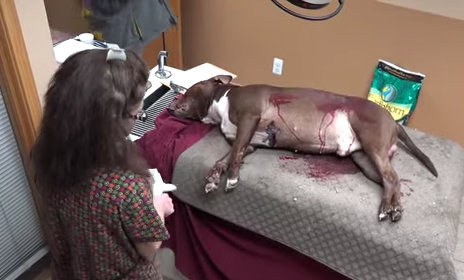Warning: Graphic Images.

As I reported last week, a 9 year-old boy walking his dog flagged down an officer from the Detroit Police Department (DPD) because the dog slipped his leash. The boy asked the police officer to help him get his dog. “I said it was my dog, I said can you help me find my dog.” The officer shot the dog in front of the boy instead, leaving the dog with a shattered jaw and the boy traumatized. It is not an aberration.
When it comes to dogs, the DPD appears to be, according to a family that sued and won after police killed their three dogs, a “dog death squad.” The City settled that case for $60,000 after the Court of Appeals ruled against them.
The lawsuit stemmed from the killing of the dogs during a raid on a home for marijuana. As I reported in 2017 when it was working its way through the courts, the plaintiff claimed that one of the dogs was shot “through a closed bathroom door. Graphic photos from the raid on the house showed the dog lying dead in a blood-soaked bathroom.”

It was “only one of several lawsuits that have been filed against the DPD for dog shootings [in recent years]… The City of Detroit settled one of those suits for $100,000 after dash cam video showed an officer shooting a man’s dog while the dog was chained to a fence: The most recent was filed in June after DPD officers allegedly shot a couple’s dogs while the animals were behind a backyard fence.” (The DPD settled that case for $225,000.) There are other cases, which likewise settled with payouts to families.

An “investigation last year [2016] found the DPD’s Major Violators Unit, which conducts drug raids in the city, has a track record of leaving dead dogs in its wake. One officer had shot 39 dogs over the course of his career.” But he wasn’t done. “That officer is now up to 73 kills:” That was back in 2017.

The officer who killed one of the three dogs in the current case “laughed and said … ‘Did you see that? I got that one good,’ according to the lawsuit…”
Unfortunately, a Federal District Court originally dismissed the case because the dogs were not licensed. And an unlicensed dog, ruled the Court, is not a dog. It is illegal contraband. It was the only Federal Court to make such a ruling in the current century, harkening back to laws that were in place over 100 years ago in the 19th.
When that untenable ruling was handed down, I predicted it would be reversed on appeal. It was. “In its ruling, the [appeals] court said that officers just can’t ‘kill every unlicensed dog on the spot.'” Given its track record and the lawlessness of the officers, the City had no choice but to settle.
Tragically, it is not the only department where officers needlessly kill dogs. Every year in the U.S., over 10,000 dogs are shot by police. Following lawsuits similar to those against the DPD, juries are awarding million dollar verdicts and cities are settling for hundreds of thousands of dollars. That won’t bring the dogs back. But it may hold police departments accountable. In fact, a Kansas study found that most police officers receive no training on safe animal handling even though 90% of police officers want it. The study concluded that “Kansas Law Enforcement Officers perform animal control duties — many without the proper training — even though most consider such training to be important to be able to perform their duties safely.”
Although the study looked at officer safety (i.e., to prevent risk of rabies), such training is also very important to dogs and the people who love them. One department — in neighboring Kansas City, MO — reduced the shooting of dogs by 80% after officers were trained by a dog behaviorist and adopted new practices consistent with that training.
Similarly, Niagara County, NY, police use fire extinguishers instead of guns to repel dogs: “It’s very noisy and very cold. It tastes bad. But it doesn’t do any damage to the dog. ‘I’ve talked to many, many officers who have used fire extinguishers, and I have never heard of a case where they didn’t work.'”
The question is: Do Detroit officials care enough about dogs, the families of those dogs, or even the money they have been paying in settlements to force such accountability on its officers? The answer, at least so far, appears to be, “No.”
————-
Have a comment? Join the discussion by clicking here.